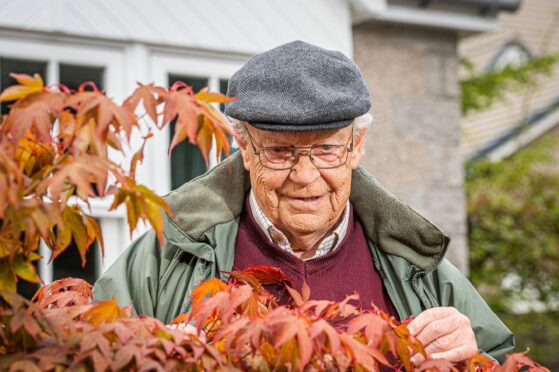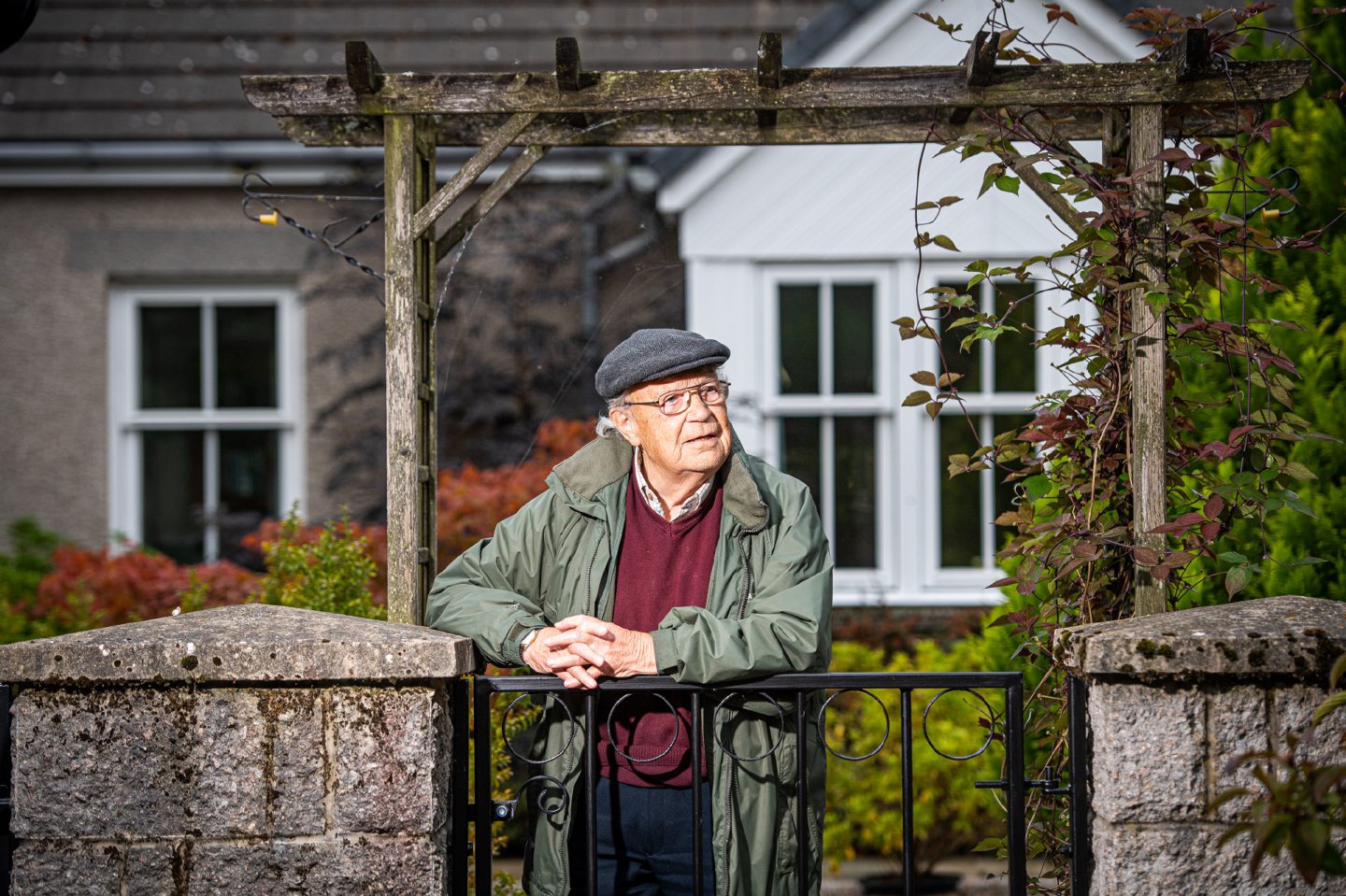Jim McColl has lost none of the passion for gardening which has been a huge part of his life and transformed him into a television personality.
But these days, the former Beechgrove presenter has to rely on the green fingers of other people to help him as he tends to his plants and seedlings in Oldmeldrum.
He has neuropathy – a condition which affects his ability to grasp items properly, be it a spade or a six-iron – and, while Jim doesn’t moan about his lot in life, he describes it as “a scunner” which has left him reliant on colleagues to do a lot of heavy lifting.
The 86-year-old told me: “The tips of my fingers have no power because they are not getting the messages from the nerves at shoulder level. For example, I cannot tear open a little sachet of salt because I have no grip. It was first detected when I noticed that I couldn’t grasp a hoe – or a golf club – strongly enough to be effective.
“Many a job has to be left to others, such as using secateurs or even scissors. I can prune using long handled pruners requiring both hands, but if the growth is teuch [tough], I have to give up.
“I attend Aberdeen Royal Infirmary every six weeks to have an ‘infusion’ of gubbins which takes about five hours. There has been no improvement, though I believe it prevents the condition from getting worse. Neuropathy is a scunner.”
Earlier this week, Jim wrote the last of his long-running Press and Journal columns on horticulture and while he is not a sentimental chap, you can sense his frustration as he gazes back at the old Beechgrove programmes, views his youthful joie de vivre and recalls how his cherished colleague George Barron stunned many viewers when he casually mentioned he was off “for a wee jobbie in the potting shed”.
That was in the late 1970s, since when Beechgrove has become a hardy annual in the schedules, making a mockery of those who feared it might be a nine-day wonder.
As Jim said: “I had long discussed the lack of a Scottish programme with colleagues, because the BBC seemed happy with gardening shows made exclusively in/for England.
“I had worked in the south from 1958 till 1972, so I was well informed on the subject. At the beginning, we were given a blank canvas. There was nothing set in stone. Beechgrove was going to be out there, in the back garden. And the rest is history.
‘Talking about something we loved’
“In the early days, one of the funny things was hearing people ask: ‘What makes you think that you know all this and can present it as if you are doing the right thing?’
“My answer to that was that George Barron was standing next to me and he had 60 years’ experience and I’ve got 40 years’ experience in horticulture.
“That is 100 years between the two of us. So if we canna talk for three minutes about how to grow tatties, then it’s a pretty poor do!”
His TV career began in low-key fashion in Aberdeen in 1978, and although Jim exited the series three years ago, he is still a fount of wisdom on gardening matters and has witnessed dramatic changes in everything from the Scottish climate to the sprouting popularity in allotments and people of all ages taking an interest in creating and maintaining their own little places of growth.
The impact of Covid-19, where so many were restricted to their own homes for many months, had plenty of downsides, but it meant they could nurture flowers and plant herbs and vegetables and learn, as Jim always says, that “every day’s a school day”.
He said: “There are definitely signs of climate change – the most obvious, much discussed and reported, is the pattern of rainfall and how it has affected agricultural crops and the natural world. It has affected vegetable crops in our gardens.
“Temperature patterns are changing as well. I have tried to encourage a junior school or two to record daily maximum and minimum temperatures and rainfall because the outcomes of these changes will affect these very children when they are adults – even if it makes nae odds to me.
“We’ve learned there are more than three million new gardeners in the country following the Covid epidemic. These newcomers have discovered what many of us have known for yonks. That it is a profitable pastime as well as being good for our health.
“However, with that surge of interest has come all sorts of diversions such as ‘re-wilding’ or, in other words for people of my age, letting your wee slice of God’s green earth go to wrack and ruin!
“Of course, we can have wilder, untidier parts of our garden to encourage the local wildlife, but the fruit and vegetable areas, for instance, are best kept in good nick if they are to be productive, and if I want to sit out on a nicely-mown lawn which helps set off the flower displays of my favourite plants, why should I be frowned upon?”
Even in his ninth decade, Jim is a fervent advocate of his specialist subject and there’s no lack of positivity in his arguments, regardless of his issues with neuropathy.
As he told me, gardening is for everybody, it has no borders (except for the herbaceous variety), it can be therapeutic, help people’s mental health, encourage other initiatives including the Men’s Shed movement and, armed with a few seeds, some basic tools and a sprinkling of patience, develop from an early enthusiasm into a lifelong love affair.
He said: “I once visited a set of new allotments and, in the course of the day, I introduced a new gardener to an experienced chap and guess what? They actually lived in the same street but they didn’t know one another because their paths had never crossed. Gardening had done it again – created a new friendship!”
In Jim’s case, it is also a profession which he started in 1954 with a year’s practical before he went on to college and never regretted bedding himself to a pursuit which has provided endless hours of joy and pleasure and communing with nature.
And he knows that no matter how much you have done on the lawn, in the greenhouse or amid the hanging baskets, there will always be other wee jobbies to deal with.
FIVE QUESTIONS FOR JIM McCOLL
- What book are you reading? “I’m happily ploughing through Wilbur Smith and Clive Cussler, turn about. I just love their nonsense, having first read them years ago.
- Who’s your hero? “James Bond”.
- Can you speak a foreign language? “I did study French and Latin at school. Many plants’ proper names are derived from Latin and I could pronounce the names and understand their meaning from early on! That has been a great help.”
- What’s your favourite album or musician? “I love some of the classics but traditional Scottish as played by the Scottish Fiddle Orchestra is top of the pops for me.”
- What is your most prized possession? “My memory”.






Conversation